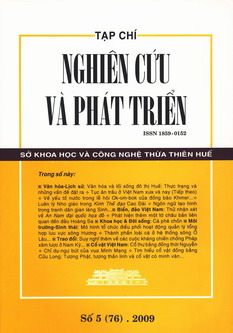Luân lý Nho giáo trong Kinh Thế đạo Cao Đài/Confucius’s Ethical Principles Reflected by Cao Đài Scripture on the Worldly Way
Tóm tắt
Một trong những tiêu ngữ của đạo Cao Đài là Nho tông chuyển thế, do đó thánh giáo và kinh lễ Cao Đài hầu như luôn luôn chuyển tải luân lý Nho giáo. Luân lý Nho giáo chia các mối quan hệ đạo đức của con người sống trong xã hội thành năm nhóm chủ yếu, gọi là Ngũ luân. Theo Trung dung (chương 20:2), Ngũ luân gồm có quân thần, phụ tử, phu thê, huynh đệ, bằng hữu. Kinh Thế đạo của Cao Đài gồm mười chín bài kinh cầu nguyện viết theo thể thơ song thất lục bát. Tám bài kinh trong số đó để tụng khi có đám tang và một bài dùng vào lễ cưới. Bài viết này cho thấy chín bài kinh ấy phản ánh rõ nét Ngũ luân của đạo Nho.
ABSTRACT
Nho tông chuyển thế (Applying Confucian principles for a better world) is one of Caodai mottoes; therefore, Caodai holy teachings and prayers mostly convey Confucian ethics. Confucian ethics classifies all human relationships into five main categories, namely Wulun or the Five Cardinal Relationships. According to Zhongyong or Doctrine of the Mean (chapter 20:2), these relationships are the ones between the state and citizens, parents and children, husband and wife, brothers and sisters, and between friends. Kinh Thế đạo (Scripture on the Worldly Way) of Caodaism consists of nineteen prayers written in verse (seven-seven-six-eight word meter). Besides one prayer used as part of a wedding ceremony, eight of them are recited in case of a funeral service. This article indicates that these nine mentioned prayers truly reflect the Five Cardinal Relationships taught by Confucius.

